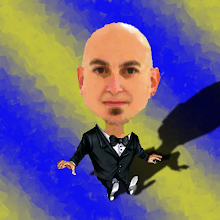I'm Pacing Myself
There's an article in the current Wired about different types of genius. Economist David Galenson at the University of Chicago is providing hope to all us slackers and idlers...
“Conceptual innovators,” as Galenson calls them, make bold, dramatic leaps in their disciplines. They do their breakthrough work when they are young. Think Edvard Munch, Herman Melville, and Orson Welles. They make the rest of us feel like also-rans. Then there’s a second character type, someone who’s just as significant but trudging by comparison. Galenson calls this group “experimental innovators.” Geniuses like Auguste Rodin, Mark Twain, and Alfred Hitchcock proceed by a lifetime of trial and error and thus do their important work much later in their careers.On Galenson's website is this pdf of a transcribed talk Malcolm Gladwell gave at Columbia. Apparently, he'd written an article on Galenson's book - Old Masters and Young Geniuses: The Two Life Cycles of Artistic Creativity - that was his first rejected by his New Yorker editor.
I guess what I’m arguing for in the end is some kind of balance between these two modes of creativity. I think we have to create a place at the table for Picasso, but also for Cezanne. It’s awfully tempting to demand certainty in everything that we do, and in all the reasons people give for their actions, and it’s awfully tempting to favor the people who peak quickly, and not over the people who take a long, long time to reach their creative peak. And I think the world is making it harder and harder for us to remember the role of the Cezannes. But I think we should keep in mind whenever we have these impulses, and feel pushed towards the carefully worked out stories and pushed towards those who peak really soon, we should keep in mind the story of Fleetwood Mac. They started out and they made fourteen albums which nobody listened to and nobody bought, and which were, quite frankly, terrible, before they created two of the greatest albums in rock and roll history.While it'll be really easy to use this as yet another poor excuse for why I don't write, I think there's something more concrete and applicable to my current incarnation.
The two dominant software development camps in many ways fit these patterns. One can readily see how a waterfall SDLC attempts to conceptualize solutions out of whole cloth, with architects generating enough documentation for piecemeal development to be handed to monkeys, whether off-shore or local. In contrast, iterative development demands each engineer engage in constant refinement. Galenson's description of Jackson Pollack's Greyed Rainbow is illustrative:
To paint it, he laid the canvas on the floor, splattered it with paint, walked around it, tacked it to the wall, looked at it, put it back on the ground, splattered it with more paint, and so on. “This painting is full of innovations,” Galenson says, “but Pollock arrived here by trial and error. He was a slow developer.”Clearly, iteration worked for Pollack (disparaging comments about Abstract Expressionism aside.)
My question then is whether conceptual innovators (as Galenson defines them) can train themselves to work in an experimentalist's mien or vice versa. Can young turks be more like Fleetwood Mac?

0 comments:
Post a Comment